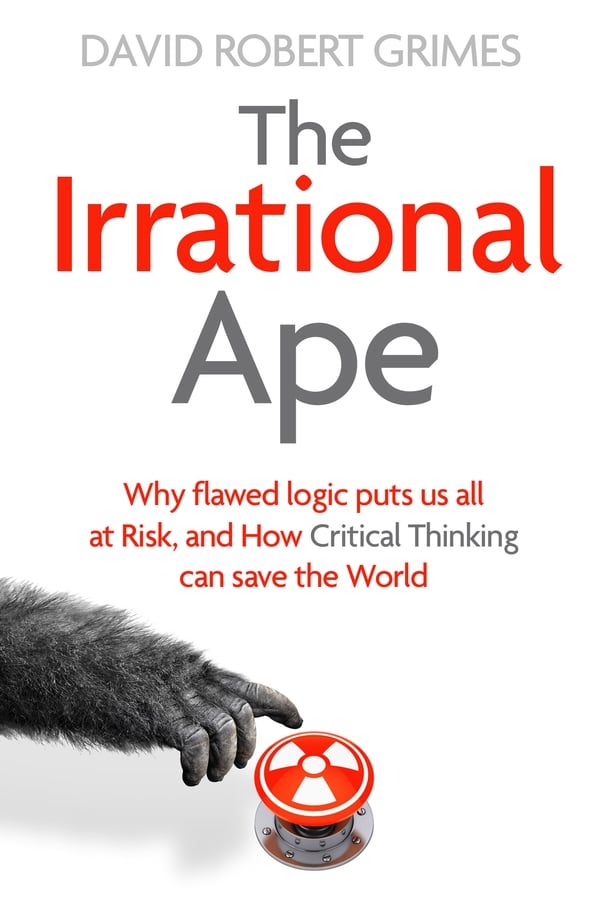The Irrational Ape is about how trust in experts, science and evidence-based studies has fallen, replaced by fake-news, the rise of populism, anti-intellectualism, the anecdote and a lack of logical thinking, writes RTÉ News Health Correspondent Fergal Bowers
We live in a polarised world, with many of the old certainties no longer viewed as such. Misinformation, untruths and viral propaganda can speed around the world, with such velocity now, via social media and the internet, that facts have a very hard time keeping pace.
The Irrational Ape is about how trust in experts, science and evidence-based studies has fallen, replaced by fake-news, the rise of populism, anti-intellectualism, the anecdote and a lack of logical thinking.
David Robert Grimes wants us to try and get back to clear reasoning, given the amazing achievements of the human race in getting this far, despite coming close to nuclear war on several occasions. He notes that our ability to reason, reflect and infer is one of our finest skills and is what perhaps best characterises us as a species.
This book also offers us a reminder of the human cost when sinister narratives take hold in a nation's psyche and when you isolate and dehumanize certain groups, the next step of elimination is not far off. He has some valuable insights into the mobbing and shaming brigade on social media, and how the act of wielding a pitchfork does not make one heroic.
A lot of myths are debunked with solid science. Remember the concerns raised by some about mobile phones and cancer? Were this link true, we would expect to have seen a surge in brain cancer, matching the huge growth in use of phones in recent decades. But studies show it is not so. A lot of the misunderstanding was down to people not understanding what electromagnetic radiation (EMR) actually is and wrongly linking it to radioactivity.

Studies show that trust around the world is in crisis, although distrust levels vary in different countries. While trust in science as a profession remains high, some particular areas of science are not doing well in this regard.
The days of 'Trust me, I’m a scientist’ no longer hold sway. Scientists have to better explain how they reach conclusions. This book very much assists in that cause.
One chapter in the book which cites a lot of complex mathematics went over my head and gave me a headache. My fault really - I guess I was out sick the day the teacher was explaining quantum physics and Pythagoras.
However, this is a very valuable book and the timing could not be better. Social media and the internet are awash with information and claims about the dangers of vaccination, fluoridation, nuclear power, GM foods, 5G and a host of other things.
But what about the science behind the concerns, which many people genuinely but mistakenly hold?
An estimated 59 percent of articles on social media are propagated by people who have not even read them. Today we encounter modern versions of snake oil salesmen and psychics, people who promote jade eggs, or believe that everything natural must be good or safe.
While many so-called cure-alls may be harmless, some are not and at the darker end of things, they may encourage people to stay away from necessary medical intervention. Remember Steve Jobs?
Watch: David Robert Grimes took part in a debate about mandatory vaccinations on RTÉ One's Prime Time last April
Some people believe that the pharmaceutical industry covers up cures for cancer; 7 percent of Americans believe the moon landings were faked, others believe climate change is a hoax perpetuated by scientists. Meanwhile, Flat Earthers hold global meetings.
The author points out that in order to believe that vaccines cause autism, you must weaken confidence in scientific authorities and argue alternative justification such as "scientists are in the pockets of Big Pharma", mainstream media cannot be trusted and you are the best judge of what’s good for your body.
The book points out that while conspiracies undoubtedly occur, keeping large ones secret for long is nigh on impossible. In our interconnected world, it’s even harder to keep things under wraps.
The book has so many interesting chapters, in particular one on anecdotes. These are often used to promote dodgy health claims. While one ‘miraculous’ recovery from a terminal illness may make a fascinating case study, it does not illustrate an underlying trend.
The author deals with the important issue of cause and effect. The mere fact that one event precedes another - illness after vaccination for example - is not in itself proof the first caused the second. Take autism as an example and the fears that were linked to the MMR vaccination. The author explains that rising rates of autism had nothing to do with vaccination, with the most likely culprit being widening diagnostic criteria for autism. Nor was the appearance of autism after vaccination particularly surprising, as autism manifests in early childhood and the markers such as impaired communication tends to become apparent by age two or three, not long after immunisation.
David Robert Grimes speaks on the subject of conspiracies on BBC World
Your reviewer attended a public meeting at the Royal Irish Academy recently where the issue of what an expert is was explored by people who are researching the issue of truth, trust and expertise around the world.
Certainly we should trust experts - but what exactly is an expert? Expertise in one domain does not necessarily translate into expertise, or even sanity, in another. An expert is someone who is competent, works with integrity and honesty in their field, has credibility, a track record and is benevolent, that is, they are disposed to act in the interests of others.
While there is much concern today over the risks posed by fake news, some studies would suggest all is far from lost. Trust in the traditional press has fallen but it appears to be rising again. While trust in the internet saw a large rise, it appears to be reducing.
Trusted sources are needed now, more than ever. Science has certainly has had its failings in the past. One only needs to think about Eugenics, or claims that an examination of people’s faces or brain scans can tell if someone is going to be a criminal or not, and of course history is littered with unethical experiments on people.
Sometimes trust is shattered. People make mistakes. Where science makes mistakes, these errors should be self-corrected, as soon as possible. Evidence-based science is vital to human progress.

The book cites a psychological profile of Adolf Hitler assembled by American authorities, during the Second World War, that should have resonance today. Hitler’s primary rules were: never allow the public to cool off; never admit fault or wrong; never concede that there may be some good in your enemy; never leave room for alternatives; never accept blame; concentrate on one enemy at a time and blame him for everything that goes wrong; people will believe a big lie sooner than a little one; and if you repeat it frequently enough people will sooner or later believe it. Sounds familiar?
The Irrational Ape is an important addition to the battle to get the human race back on track, while also detailing our amazing ability to ditch common sense and reason.
Fergal Bowers is Health Correspondent with RTÉ News







